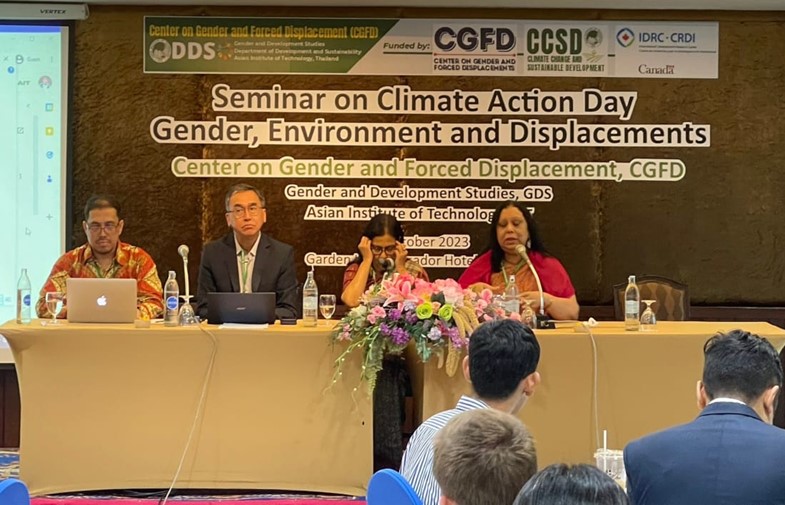On 24 October, HDFF team was invited to attend the Seminar on Climate Action Day: Gender, Environment and Displacements, hosted by the Gender and Development Studies (GDS) of Asian Institute of Technology (AIT). This seminar shed light on the importance of addressing intersectionality when dealing with climate change, gender equality, and displacement both from academic research and practical experience.
Following the Inaugural Session by the president to show AIT’s commitment to achieving SDG with a special focus on climate change, gender equality and displacement, H.E Mr. Miika Tomi, Deputy Head of Mission from the Finland Embassy gave a speech highlighting the importance of interconnection between gender, environment and displacement. He stated that climate change disproportionately affects women and girls, while women can play an important role in contributing to a green society. He also reaffirmed Finland’s commitment to promoting gender equality and sustainable development policies and required collective action to develop inclusive solutions.

(From left to right: Dr. Nyi Nyi Kyaw, Mr. Voravate Chonlasin, Prof. Amena Mohsin, Prof. Paula Banerjee)
Professor Sanjay Chaturvedi, Dean of the Faculty of Social Sciences from the Department of International Relations at South Asian University in India, gave a speech on the Keynote Paper of En-gendering ‘Anthropocene’: Changing (Counter) Cartographies of (Im)mobilities and Displacements. During the presentation, he showed his key argument and stressed there are gender blind, gender (in)sensitive, gender (un)responsive and gender (non)transformative in real practice. Not only that, he also emphasized the importance of intersectionality in climate change analysis, on how race, ethnicity, nationality, socio-economic status, etc influences how climate change affects oneself. He pointed out the gender bias in the IPCC survey, as well as how some researchers from developing countries felt that they were not being represented enough. Simultaneously, he pointed out a climate change report from ‘global south’ being able to represent gender lens better. Thus, he proposed the development of an IPCC gender policy and gender-inclusive practice.
The following panel discussion was moderated by Prof. Paula Banerjee from the Center on Gender and Forced Displacement of Gender and Development Studies of Asian Institute of Technology. Focused on the vulnerabilities and resilience of women in climate change, Professor Mokbul Morshed Ahmad shared the challenges and coping strategies of women living in India and Bangladesh. By challenging the concept of “climate change”, she explained how cyclones and salinization destroyed women’s livelihoods and how traditional social norms aggregated women’s suffering. The next speaker, Dr. Nyi Nyi Kyaw, IDRC Research Chair on Forced Displacement in Southeast Asia at Chiang Mai University in Thailand, spoke of climate change and gender perspectives being neglected in Myanmar at present. He showed great internal displaced and external migrant situations in Shan State, Chin State, Rakhine State and border areas. Due to the difficulty of realizing the current resettlement, repatriation and relocation strategy of refugees, it was important to respect ethical and religious differences to protect every citizen. The last speaker in the morning session, Mr. Voravate Chonlasin, Executive Director of AIT Extension of Asian Institute of Technology shared a case study of highland agriculture (Nan Province) in Thailand. He talked about how gender and social inclusion were being considered in climate-smart agriculture in the current project.
In the after session, Ms. Rebecca Napier-Moore from ILO in Asia and the Pacific shared the stories of how gender inequality and climate degradation led to female displacement. She also presented the gaps in intersectionality from the perspective of knowledge, policy, and green jobs and highlighted the importance of addressing the vulnerability brought by climate change. In the last session, Dr. Philippe Doneys moderated several presentations by young scholars, followed by the awarding of prizes by Dr. Ekbordin Winijkul.

Comments are closed